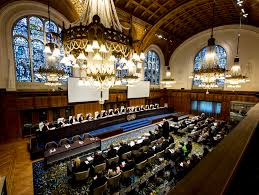The Hague on Friday fell short of ordering a ceasefire in Gaza, where Israel has killed more than 26,000 Palestinians since it waged its brutal war on 7 October.
Qatar has welcomed the International Court of Justice’s interim ruling over Israel’s war on Gaza on Friday, describing it as “a victory for humanity and the rule of international law and justice”.
“The State of Qatar welcomes the temporary measures ordered by the International Court of Justice, especially Israel taking all measures to prevent the commission of all acts within the scope of Article II of the Genocide Convention in its war on the Gaza Strip,” the Gulf state’s foreign ministry said in a statement.
The ICJ issued provisional measures in response to South Africa’s case accusing Israel of committing genocide in Gaza, which it had submitted on December 29, 2023. South Africa’s claim pointed to Israel’s violation of the 1948 Convention on the Prevention and Punishment of the Crime of Genocide.
The Hague on Friday fell short of ordering a ceasefire in Gaza, where Israel has killed more than 26,000 Palestinians since it waged the brutal war last year.
An overwhelming majority of 17 judges voted for six emergency measures that Israel must implement in Gaza, including the prevention of incitement to commit genocide and allowing more humanitarian aid into Gaza.
The court also ordered Israel to submit a report to the ICJ within a month of all measures taken in accordance with the measures.
In its statement on the ruling, Qatar said that “the issuance of the court order by an overwhelming majority reflects the magnitude of the threat of genocide facing our Palestinian brothers in the Gaza Strip, which requires ensuring the implementation of temporary measures”.
South Africa also applauded the measures, describing it as a “decisive victory” for international law while saying it “hopes that Israel will not act to frustrate the application of this order”.
Palestine’s foreign minister Riyadh Maliki said the ruling “breaks Israel’s entrenched culture of criminality and impunity, which has characterised its decades-long occupation, dispossession, persecution, and apartheid in Palestine”.
Israeli Prime Minister Benjamin Netanyahu was angered by the ICJ, saying that Israel still has an “inherent right to defend itself” and denying this would be a “blatant discrimination against the Jewish state”.
Netanyahu has repeatedly refused to accept a ceasefire in Gaza while repeatedly reiterating Israel’s right to self defence, despite mostly killing civilians in the besieged enclave.
While ICJ did not issue a final verdict, Israel’s atrocities in Gaza meet the United Nations’ definition of genocide: “A crime committed with the intent to destroy a national, ethnic, racial or religious group, in whole or in part.”
Meanwhile, rights agencies welcomed the ICJ’s measures, including Human Rights Watch and Amnesty International.
In a statement, HRW said the Hague’s “landmark decision puts Israel and its allies on notice that immediate action is needed to prevent genocide and further atrocities against Palestinians in Gaza.”
“Lives hang in the balance, and governments need to urgently use their leverage to ensure that the order is enforced. The scale and gravity of civilian suffering in Gaza driven by Israeli war crimes demands nothing less,” Balkees Jarrah, associate international justice director at HRW, said.
Amnesty separately called on Israel to comply with the ICJ’s orders while describing the ruling as “an important step that could help protect the Palestinian people in the occupied Gaza Strip from further suffering and irreparable harm.”
“Alarming signs of genocide in Gaza, and Israel’s flagrant disregard for international law highlight the urgent need for effective, unified pressure on Israel to stop its onslaught against Palestinians. An immediate ceasefire by all parties remains essential and – although not ordered by the Court – is the most effective condition to implement the provisional measures,” Agnes Callamard, Amnesty International’s Secretary General, said.
Israel’s genocidal war in Gaza has flattened the area, displacing more than 1.9 people out of the 2.2 million population.
This week saw Israeli occupation forces advance further into Khan Younis in the south, where hundreds of thousands of displaced people have been sheltering since late last week as it was presumed to be a safer zone.
The attack on Khan Younis has forced Palestinians to flee to the densely-populated city of Rafah, where around 1.3 million displaced people, 50% of Gaza’s population, are already taking shelter.
Israel continued isolating northern Gaza from aid while carrying out daily attacks in the area. The Al-Shifa Medical complex in the north, which occupation forces raided on October 12, 2023, is still cut off from aid.
The hospital currently has 120 workers and 300 patients who are isolated from the delivery of aid and urgent medical equipment.







